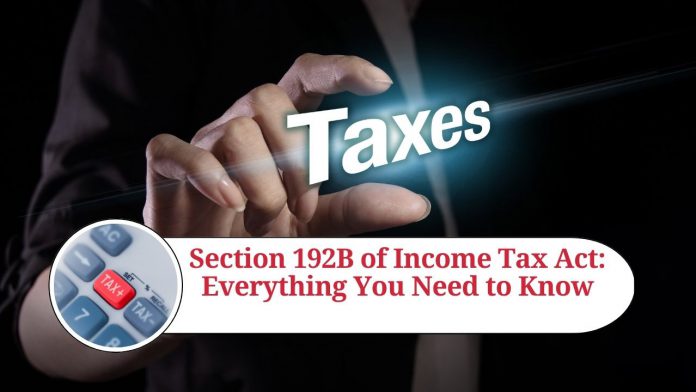Understanding Section 192B of Income Tax Act: A Comprehensive Guide
As an employee, it is important to be aware of the various provisions under the Income Tax Act that impact your tax liabilities. One such provision is Section 192B, which deals with the taxation of arrears of salary. In this blog, we will take a closer look at Section 192B and its key provisions.
What is Section 192B?
Section 192B of the Income Tax Act, 1961 deals with the taxation of arrears of salary. This section is applicable to salaried employees who have received arrears of salary from their employer. Arrears of salary refer to the amount of salary that is due to an employee but has not been paid in a previous year or years.
Key Provisions of Section 192B
- Applicability Section 192B is applicable only to salaried employees who have received arrears of salary. This section is not applicable to individuals who are not employed or to those who do not receive a salary.
- Taxation Arrears of salary are taxed in the year in which they are received. This means that if an employee receives arrears of salary in the current financial year, they will be taxed in the current financial year.
- Computation of Tax Liability The tax liability on arrears of salary is computed by adding the arrears to the income of the employee in the year in which they are received. The tax is then calculated based on the income tax slab rate applicable to the employee in that year.
- Relief under Section 89(1) Employees who receive arrears of salary are eligible for relief under Section 89(1) of the Income Tax Act. This relief is provided to ensure that the tax liability of an employee does not exceed the amount that would have been payable if the arrears had been received in the year in which they were due. To claim this relief, employees need to submit Form 10E to the Income Tax Department.
- TDS Deduction Employers are required to deduct TDS on arrears of salary as per the income tax slab rate applicable to the employee in the year in which the arrears are paid. However, if the arrears relate to a previous year or years, the TDS rate applicable to that year or years would apply.
Conclusion
Section 192B of the Income Tax Act, 1961 is an important provision that impacts the tax liabilities of salaried employees who receive arrears of salary. It is important for employees to be aware of the provisions of this section and to ensure that they comply with the relevant requirements under the law. By doing so, employees can avoid penalties and ensure that their tax liabilities are correctly calculated.
Read more useful content:
- section 145 of income tax act
- section 10e of income tax act
- section 9 of the income tax act
- section 94b of income tax act
- section 206aa of income tax act
Frequently Asked Questions (FAQs)
Q: What is Section 192B of the Income Tax Act? A: Section 192B of the Income Tax Act deals with the taxation of arrears of salary received by salaried employees.
Q: Who does Section 192B apply to? A: Section 192B applies to salaried employees who have received arrears of salary from their employer.
Q: How are arrears of salary taxed under Section 192B? A: Arrears of salary are taxed in the year in which they are received. The tax liability is computed by adding the arrears to the income of the employee in the year in which they are received.
Q: Can an employee claim relief under Section 89(1) for arrears of salary? A: Yes, employees who receive arrears of salary are eligible for relief under Section 89(1) of the Income Tax Act.
Q: What is the relief provided under Section 89(1)? A: The relief provided under Section 89(1) ensures that the tax liability of an employee does not exceed the amount that would have been payable if the arrears had been received in the year in which they were due.
Q: How can an employee claim relief under Section 89(1)? A: To claim relief under Section 89(1), employees need to submit Form 10E to the Income Tax Department.
Q: Are employers required to deduct TDS on arrears of salary? A: Yes, employers are required to deduct TDS on arrears of salary as per the income tax slab rate applicable to the employee in the year in which the arrears are paid.
Q: What happens if an employee fails to comply with the provisions of Section 192B? A: Failure to comply with the provisions of Section 192B can result in penalties and incorrect calculation of tax liabilities. It is important for employees to be aware of the provisions of this section and to comply with the relevant requirements under the law.




















